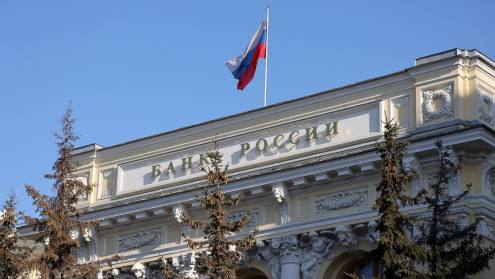Eighteen months ago, Boris Tymonkin, chairman of Ukrsotsbank, Ukraine’s fourth largest bank, ventured that most of Ukraine’s banking system would soon be in foreign hands. Today, less than half of the industry is owned by outsiders, but Mr Tymonkin knows the imminent transfer of Ukrsotsbank, which boasts almost 10,000 staff and 500 branches and outlets, from the grip of a home-grown tycoon into the hands of Italy’s Banca Intesa will soon tip the scales towards his prediction.
So far, France’s BNP Paribas and Credit Agricole, Austrian players Raiffeisen and Erste, Hungary’s OTP and Greece’s Eurobank, among others, have bought Ukrainian institutions. Ukrsotsbank is expected to be swallowed up by Intesa in a $1.3bn transaction some time in 2007, as soon as a typically messy court case pitching majority shareholder Viktor Pinchuk against a rival businessman with an interest in the bank is finally resolved.
Interesting market
Mr Tymonkin smiles when asked why there is a queue of foreign bankers trying to snap up Ukrainian financial assets. “You walk on the streets, you can see this market is interesting,” he says, pointing out of the window of his headquarters in Kiev’s Kovpak Street, where building work to accommodate Ukrsotsbank’s expansion is expected to finish by the end of next year. “But in reality, it is even more interesting than it appears on the outside.”
He talks enthusiastically about a market of more than 40 million people requiring credit lines, with a growing economy fuelled by a demand for consumer goods. Ukrsotsbank shares are up 80% this year. Profits after provisions and tax are $50m. Mr Tymonkin forecasts an $80m profit next year and $115m the year after. “It won’t be like this all the time, but for the next five years, our growth rate will be high. And I don’t mean just fairly high, but very high,” he says.
Ukrsotsbank only entered the retail credit arena five years ago. Previously, its clientele was purely corporate. Today, there is about Hr5.2bn ($1.1bn) out on loan to personal customers, dominated by mortgages, but with larger numbers of customers borrowing smaller amounts to buy cars and household goods. Mr Tymonkin brushes aside competitors’ claims to lend money at apparently much lower percentage rates. “They are not including commissions in their advertised rates,” claims the wily Mr Tymonkin.
Political caution
He acknowledges that some foreign bankers are still wary of Ukraine, due to political considerations, but believes they will join the fray. “Citibank may be a little scared, just as we are scared of becoming part of an American bank,” he jokes. “But I think eventually, they will go into Ukraine in the same way as they have gone into Russia.”
Although Mr Tymonkin is a pragmatist, who knows the transfer of ownership to a leading Italian institution will be a good thing for his bank, he refuses to criticise the colourful and often controversial oligarchs who have played such a big role in shaping the country’s often brutal business landscape. These include Mr Pinchuk, son-in-law of disgraced former Ukraine president Leonid Kuchma, and his sometime co-investor and Shakhtar Donetsk football club owner, Rinat Akhmetov. (Both men were involved in a privatisation rigged by Mr Kuchma, picking up the Kryvorizhstal steel mill for just $800m. After the Orange Revolution, the transaction was reversed by President Viktor Yushchenko, and the enterprise retendered on live television, with Mittal paying $4.8bn).
Mr Tymonkin does not deny that the connection with Mr Pinchuk has been badly perceived outside Ukraine. He says: “The new ownership will make it easier for us to borrow money, it will lower sovereign risk and it will give us the possibility to recruit staff with better experience, and we will inherit the goodwill of a large Italian banking group.”
Emerging market
Mr Tymonkin demonstrates a deep understanding and analysis of Ukraine’s political machinations, including almost daily changes in the make-up of the governing coalition, and believes this is typical of an emerging market. “After the Orange Revolution, things were not comfortable for the first six months, with all businesses cutting back on investment,” he says. But after the initial “bad period”, and following the appointment of the technocratic Yuri Yekhanurov as prime minister to replace Yulia Tymoshenko, the country was operating within a system of “normal economics”.
Even though Mr Yekhanurov was replaced after the last election by Viktor Yanukovich, representing the Party of the Regions, which is bankrolled by Donbas industrial overlord Mr Akhmetov, the normality continues, says Mr Tymonkin. “The government is more professional now than it was,” he says. “Politically, for me, the system we used to have was basically a fantasy system under Kuchma and previously under the Soviet Union and Politburo. We had a president who didn’t have to answer to anybody.
“Now, after constitutional changes, there is a chance to become a democratic republic, with an effective mass media and a good political system. That is the way the country is heading. It is much more interesting to watch our news on the television than in Russia, where they are going back to the Soviet Union, where everybody says exactly the same thing, but just tries to say it better.”











